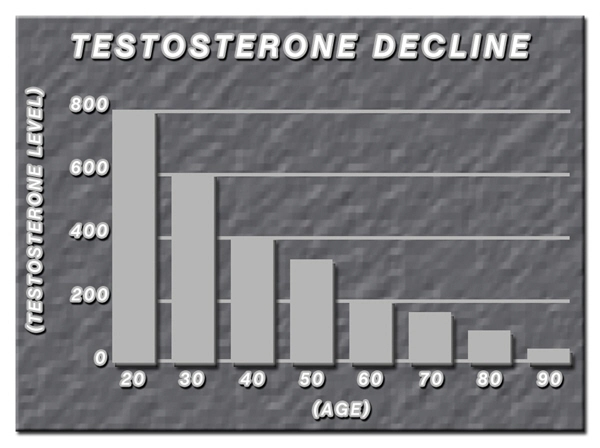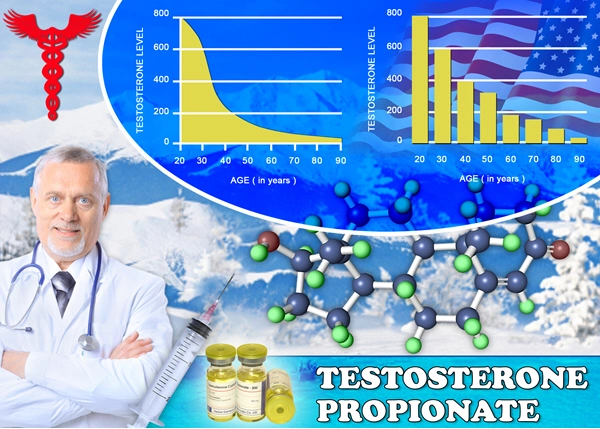Introduction
Testosterone Enanthate, a widely prescribed form of testosterone replacement therapy (TRT), has become a focal point in discussions about male health and longevity. As American men increasingly turn to TRT to combat the effects of hypogonadism and age-related testosterone decline, understanding the therapy's impact on life expectancy is crucial. This article delves into the relationship between Testosterone Enanthate therapy and life expectancy, providing insights into its potential benefits and considerations for American males.
The Role of Testosterone in Male Health
Testosterone, the primary male sex hormone, plays a vital role in numerous physiological processes, including muscle mass maintenance, bone density, red blood cell production, and libido. As men age, testosterone levels naturally decline, which can lead to symptoms such as fatigue, reduced muscle mass, and decreased sexual function. Testosterone Enanthate therapy aims to restore testosterone levels to a normal range, potentially improving quality of life and overall health.
Testosterone Enanthate and Cardiovascular Health
One of the primary concerns surrounding TRT is its impact on cardiovascular health, a critical factor in determining life expectancy. Studies have yielded mixed results, with some suggesting that TRT may increase the risk of cardiovascular events, while others indicate potential cardiovascular benefits. A 2018 meta-analysis published in the *Journal of the American Medical Association* found no significant association between TRT and cardiovascular risk in men with low testosterone levels. However, individual responses to TRT can vary, and men with pre-existing cardiovascular conditions should approach TRT with caution and under close medical supervision.
Impact on Metabolic Health and Longevity
Testosterone Enanthate therapy has been shown to positively affect metabolic health, which is closely linked to life expectancy. Low testosterone levels are associated with increased visceral fat, insulin resistance, and a higher risk of developing type 2 diabetes. By improving insulin sensitivity and reducing fat mass, TRT may contribute to better metabolic health and potentially increase life expectancy. A study published in *Diabetes Care* in 2016 demonstrated that TRT in hypogonadal men led to significant improvements in insulin sensitivity and glycemic control.
Bone Health and Longevity
Osteoporosis, a condition characterized by weakened bones, is a significant concern for aging men and can impact life expectancy. Testosterone plays a crucial role in maintaining bone density, and its decline with age can contribute to bone loss. Testosterone Enanthate therapy has been shown to increase bone mineral density in hypogonadal men, potentially reducing the risk of fractures and improving overall bone health. A 2016 study in the *Journal of Clinical Endocrinology & Metabolism* found that TRT significantly increased lumbar spine bone mineral density in men with low testosterone levels.
Psychological Well-being and Quality of Life
While not directly impacting life expectancy, psychological well-being and quality of life are important considerations in the context of TRT. Low testosterone levels have been associated with depression, anxiety, and reduced cognitive function. Testosterone Enanthate therapy has been shown to improve mood, energy levels, and cognitive performance in some men, potentially enhancing overall quality of life. A 2017 study published in *The Aging Male* reported significant improvements in depression scores and quality of life measures in hypogonadal men treated with TRT.
Considerations and Monitoring
While Testosterone Enanthate therapy offers potential benefits for American men, it is essential to approach TRT with careful consideration and ongoing monitoring. Regular blood tests to monitor testosterone levels, hematocrit, and prostate-specific antigen (PSA) are crucial to ensure safe and effective treatment. Men considering TRT should consult with a qualified healthcare provider to discuss the potential risks and benefits based on their individual health profile.
Conclusion
Testosterone Enanthate therapy holds promise for improving various aspects of male health that can contribute to increased life expectancy, including cardiovascular, metabolic, and bone health. However, the relationship between TRT and longevity is complex and requires further research. American men considering Testosterone Enanthate therapy should weigh the potential benefits against the risks and engage in open discussions with their healthcare providers to make informed decisions about their health and well-being.

- Testosterone Enanthate: Enhancing Athletic Performance and Associated Risks in American Athletes [Last Updated On: March 1st, 2025] [Originally Added On: March 1st, 2025]
- Testosterone Enanthate: A Promising Treatment for Sexual Dysfunction in American Males [Last Updated On: March 17th, 2025] [Originally Added On: March 17th, 2025]
- Testosterone Enanthate: Benefits, Risks, and Safe Use for American Men [Last Updated On: March 19th, 2025] [Originally Added On: March 19th, 2025]
- Testosterone Enanthate: Long-term Effects and Health Risks for American Men [Last Updated On: March 19th, 2025] [Originally Added On: March 19th, 2025]
- Personalized Testosterone Enanthate Therapy for American Men: Tailoring TRT for Optimal Results [Last Updated On: March 20th, 2025] [Originally Added On: March 20th, 2025]
- Testosterone Enanthate's Impact on Sleep Patterns in American Men: A Comprehensive Analysis [Last Updated On: March 20th, 2025] [Originally Added On: March 20th, 2025]
- Testosterone Enanthate: A Promising Therapy for Chronic Pain in American Males [Last Updated On: March 21st, 2025] [Originally Added On: March 21st, 2025]
- Testosterone Enanthate: Enhancing Weight Management in American Men [Last Updated On: March 21st, 2025] [Originally Added On: March 21st, 2025]
- Testosterone Enanthate: Impacts on Prostate Health and Monitoring Guidelines [Last Updated On: March 21st, 2025] [Originally Added On: March 21st, 2025]
- Testosterone Enanthate: Enhancing Cognitive Function in American Men [Last Updated On: March 22nd, 2025] [Originally Added On: March 22nd, 2025]
- Testosterone Enanthate: A Promising Treatment for Osteoporosis in American Men [Last Updated On: March 22nd, 2025] [Originally Added On: March 22nd, 2025]
- Testosterone Enanthate: Dispelling Myths and Understanding Medical Use in the US [Last Updated On: March 22nd, 2025] [Originally Added On: March 22nd, 2025]
- Testosterone Enanthate's Impact on Hair Growth and Loss in American Men [Last Updated On: March 22nd, 2025] [Originally Added On: March 22nd, 2025]
- Testosterone Enanthate: Cycle, Dosage, and Risks for American Male Athletes [Last Updated On: March 22nd, 2025] [Originally Added On: March 22nd, 2025]
- Testosterone Enanthate: Boosting Immune Function in American Men [Last Updated On: March 22nd, 2025] [Originally Added On: March 22nd, 2025]
- Testosterone Enanthate: A Promising Treatment for Anemia in American Men with Hypogonadism [Last Updated On: March 22nd, 2025] [Originally Added On: March 22nd, 2025]
- Testosterone Enanthate: A Potential Treatment for Depression in American Men [Last Updated On: March 22nd, 2025] [Originally Added On: March 22nd, 2025]
- Ethical Considerations of Testosterone Enanthate Use Among American Males [Last Updated On: March 23rd, 2025] [Originally Added On: March 23rd, 2025]
- Testosterone Enanthate: Benefits and Risks for Joint Health in American Men [Last Updated On: March 23rd, 2025] [Originally Added On: March 23rd, 2025]
- Testosterone Enanthate's Impact on American Males' Body Composition: Muscle and Fat Changes [Last Updated On: March 24th, 2025] [Originally Added On: March 24th, 2025]
- Testosterone Enanthate: Enhancing Injury Recovery in American Males - Benefits and Risks [Last Updated On: March 24th, 2025] [Originally Added On: March 24th, 2025]
- Testosterone Enanthate's Impact on Male Fertility: Insights for American Males [Last Updated On: March 24th, 2025] [Originally Added On: March 24th, 2025]
- Testosterone Enanthate: Enhancing Emotional Well-being in American Males [Last Updated On: March 24th, 2025] [Originally Added On: March 24th, 2025]
- Testosterone Enanthate: Enhancing Endurance in American Male Athletes [Last Updated On: March 24th, 2025] [Originally Added On: March 24th, 2025]
- Testosterone Enanthate: Combating Age-Related Decline in American Men [Last Updated On: March 25th, 2025] [Originally Added On: March 25th, 2025]
- Testosterone Enanthate's Impact on Vision and Eye Health in American Males [Last Updated On: March 25th, 2025] [Originally Added On: March 25th, 2025]
- Testosterone Enanthate Therapy: Benefits and Considerations for Men Over 50 [Last Updated On: March 25th, 2025] [Originally Added On: March 25th, 2025]
- Testosterone Enanthate: Cultural Perceptions, Health Risks, and Ethical Debates in the U.S. [Last Updated On: March 25th, 2025] [Originally Added On: March 25th, 2025]
- Testosterone Enanthate: A Promising Treatment for Chronic Fatigue Syndrome in American Males [Last Updated On: March 25th, 2025] [Originally Added On: March 25th, 2025]
- Testosterone Enanthate: A Promising Aid in Managing Stress for American Men [Last Updated On: March 25th, 2025] [Originally Added On: March 25th, 2025]
- Testosterone Enanthate's Impact on Glycemic Control in American Men: A Comprehensive Review [Last Updated On: March 26th, 2025] [Originally Added On: March 26th, 2025]
- Testosterone Enanthate: Enhancing Respiratory Function in American Men [Last Updated On: March 26th, 2025] [Originally Added On: March 26th, 2025]
- Testosterone Enanthate Therapy: Enhancing Veterans' Health and Well-being [Last Updated On: March 26th, 2025] [Originally Added On: March 26th, 2025]
- Testosterone Enanthate: A Promising Treatment for Obesity in American Males [Last Updated On: March 26th, 2025] [Originally Added On: March 26th, 2025]
- Testosterone Enanthate: Enhancing Post-Surgical Recovery in American Men [Last Updated On: March 26th, 2025] [Originally Added On: March 26th, 2025]
- Testosterone Enanthate: Benefits, Limitations, and Management for American Men [Last Updated On: March 26th, 2025] [Originally Added On: March 26th, 2025]
- Testosterone Enanthate: A Promising Therapy for Autoimmune Disorders in American Males [Last Updated On: March 26th, 2025] [Originally Added On: March 26th, 2025]
- Testosterone Enanthate: A Novel Approach to Managing Allergies in American Males [Last Updated On: March 26th, 2025] [Originally Added On: March 26th, 2025]
- Testosterone Enanthate's Impact on Mental Clarity in American Males: A Comprehensive Review [Last Updated On: March 26th, 2025] [Originally Added On: March 26th, 2025]
- Cost-Benefit Analysis of Testosterone Enanthate for American Males: Economic and Health Impacts [Last Updated On: March 26th, 2025] [Originally Added On: March 26th, 2025]
- Testosterone Enanthate's Impact on Cardiovascular Endurance in American Men [Last Updated On: March 27th, 2025] [Originally Added On: March 27th, 2025]
- Testosterone Enanthate Withdrawal: Symptoms and Management Strategies for American Males [Last Updated On: March 27th, 2025] [Originally Added On: March 27th, 2025]
- Testosterone Enanthate: A Promising Treatment for Muscle Wasting in American Males [Last Updated On: March 27th, 2025] [Originally Added On: March 27th, 2025]
- Testosterone Enanthate's Impact on Dental Health in American Males: A Comprehensive Review [Last Updated On: March 28th, 2025] [Originally Added On: March 28th, 2025]
- Testosterone Enanthate Enhances Skin Elasticity in American Males: Mechanisms and Implications [Last Updated On: March 28th, 2025] [Originally Added On: March 28th, 2025]
- Optimizing Testosterone Enanthate Therapy: Dosage, Monitoring, and Lifestyle Integration for American Males [Last Updated On: March 28th, 2025] [Originally Added On: March 28th, 2025]
- Testosterone Enanthate's Impact on Hearing in American Men: A Comprehensive Review [Last Updated On: March 28th, 2025] [Originally Added On: March 28th, 2025]
- Testosterone Enanthate's Impact on Liver Health in American Men: Risks and Monitoring [Last Updated On: March 28th, 2025] [Originally Added On: March 28th, 2025]
- Testosterone Enanthate's Impact on Appetite, Digestion in American Men: A Comprehensive Analysis [Last Updated On: March 28th, 2025] [Originally Added On: March 28th, 2025]
- Testosterone Enanthate: Potential Benefits for Diabetes Management in American Men [Last Updated On: March 29th, 2025] [Originally Added On: March 29th, 2025]
- Testosterone Enanthate Therapy: Impacts on Kidney Function in American Males [Last Updated On: March 31st, 2025] [Originally Added On: March 31st, 2025]
- Testosterone Enanthate: A Potential Treatment for Gastrointestinal Disorders in American Males [Last Updated On: April 1st, 2025] [Originally Added On: April 1st, 2025]
- Testosterone Enanthate: Muscle Growth vs. Reproductive Health Risks in American Males [Last Updated On: April 2nd, 2025] [Originally Added On: April 2nd, 2025]
- Testosterone Enanthate's Role in Managing Hypertension in American Males: Benefits and Risks [Last Updated On: April 2nd, 2025] [Originally Added On: April 2nd, 2025]
- Testosterone Enanthate's Neurological Benefits and Safe Use in American Men [Last Updated On: April 3rd, 2025] [Originally Added On: April 3rd, 2025]
- Testosterone Enanthate's Impact on Thyroid Function in American Men: A Comprehensive Analysis [Last Updated On: April 6th, 2025] [Originally Added On: April 6th, 2025]
- Testosterone Enanthate's Impact on Immune Function in American Males: A Comprehensive Review [Last Updated On: April 6th, 2025] [Originally Added On: April 6th, 2025]
- Testosterone Enanthate: Enhancing Respiratory Health in American Men [Last Updated On: April 7th, 2025] [Originally Added On: April 7th, 2025]
- Testosterone Enanthate: Enhancing Musculoskeletal Health in American Men [Last Updated On: April 7th, 2025] [Originally Added On: April 7th, 2025]
- Cardiovascular Effects of Testosterone Enanthate in American Males: Risks and Management [Last Updated On: April 9th, 2025] [Originally Added On: April 9th, 2025]
- Testosterone Enanthate: Managing Metabolic Disorders in American Males [Last Updated On: April 10th, 2025] [Originally Added On: April 10th, 2025]
- Testosterone Enanthate's Impact on Adrenal Health in American Males: A Comprehensive Analysis [Last Updated On: April 10th, 2025] [Originally Added On: April 10th, 2025]
- Testosterone Enanthate: Impacts on Endocrine System and Long-term Health in American Men [Last Updated On: April 11th, 2025] [Originally Added On: April 11th, 2025]
- Testosterone Enanthate's Impact on Gastrointestinal Health in American Males [Last Updated On: April 12th, 2025] [Originally Added On: April 12th, 2025]
- Testosterone Enanthate: Enhancing Hematological Health in American Men [Last Updated On: April 12th, 2025] [Originally Added On: April 12th, 2025]
- Testosterone Enanthate's Role in Neurological Health for American Males: Emerging Benefits [Last Updated On: April 12th, 2025] [Originally Added On: April 12th, 2025]
- Testosterone Enanthate: Exploring Dermatological Benefits for American Men's Skin Health [Last Updated On: April 13th, 2025] [Originally Added On: April 13th, 2025]
- Testosterone Enanthate: A Promising Treatment for Hematological Disorders in American Men [Last Updated On: April 16th, 2025] [Originally Added On: April 16th, 2025]
- Testosterone Enanthate: Managing Hypogonadism and Enhancing Quality of Life in American Males [Last Updated On: April 16th, 2025] [Originally Added On: April 16th, 2025]
- Testosterone Enanthate: Benefits, Reproductive Impacts, and Management Strategies [Last Updated On: April 17th, 2025] [Originally Added On: April 17th, 2025]
- Testosterone Enanthate's Impact on Respiratory Health in American Males: Current Insights [Last Updated On: April 18th, 2025] [Originally Added On: April 18th, 2025]
- Testosterone Enanthate Therapy: Cardiovascular Impacts and Risks in American Men [Last Updated On: April 18th, 2025] [Originally Added On: April 18th, 2025]
- Testosterone Enanthate: Enhancing Immune Function in American Men [Last Updated On: April 19th, 2025] [Originally Added On: April 19th, 2025]
- Testosterone Enanthate's Impact on Metabolic Health in American Males with Hypogonadism [Last Updated On: April 19th, 2025] [Originally Added On: April 19th, 2025]
- Testosterone Enanthate: A Promising Treatment for Musculoskeletal Disorders in American Males [Last Updated On: April 19th, 2025] [Originally Added On: April 19th, 2025]
- Testosterone Enanthate: Enhancing Gut Health in American Men [Last Updated On: April 19th, 2025] [Originally Added On: April 19th, 2025]
- Testosterone Enanthate's Impact on Skin Health in American Males: Benefits and Risks [Last Updated On: April 19th, 2025] [Originally Added On: April 19th, 2025]



List of USA state clinics - click a flag below for blood testing clinics.
Word Count: 649



















































